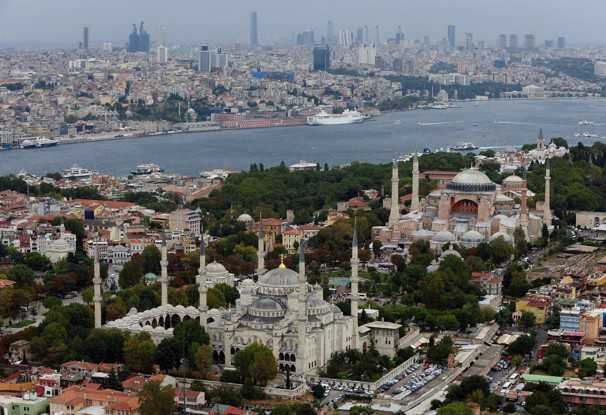BEIJING — The most prominent Uighur intellectual in China was blocked Saturday from leaving the country at Beijing international airport as he tried to board a flight for Chicago.
Ilham Tohti, 43, a professor who teaches at the Central Minorities University in Beijing, was brought back to his home late Saturday after 10 hours in custody. His teenage daughter, who was traveling with him, was permitted to travel to the United States on a later flight.
According to Nury Turkel, a Washington lawyer, Tohti was on his way to take up a visiting scholar position at Indiana University, traveling on a temporary work-study visa.
“He had no plans to stay in the United States. He was a visiting scholar, the same as many Chinese professors,’’ Turkel said.
Considered a moderate by many activists, Tohti focused on the lack of economic opportunities for Uighurs, who have been shut out of the boom in northwestern China’s Xinjiang region, where most live. His website has highlighted the difficulty of Uighurs and other minorities in obtaining passports and traveling outside of China.
He and his family have been frequently banned from traveling in the past, including his daughter, who had obtained a visa to study in the United States.
———————————
Background
Tohti was born in Artux, Xinjiang province on October 25, 1969,[1] the son of Mahmud Tiernan Tohti (b. January 25, 1937 in Artux, Xinjiang) and Burhanduxt Meryem Ehlin Tohti (b. October 11, 1941 in Bole, Xinjiang).[citation needed] He graduated from the Northeast Normal University and the Economics School at what was then called the Central Nationalities University, now named Minzu University of China, in Beijing.[1]
In 2006 Tohti founded a website called, Uyghur Online, which published articles in Chinese and Uyghur on social issues.[1][2] In mid-2008 authorities shut down the website, accusing it of forging links to extremists in the Uyghur diaspora.[2] In a March 2009 interview with Radio Free Asia, Tohti criticized the Chinese government’s policy to allow migrant workers into Xinjiang and the phenomenon of young Uyghur women moving to eastern China to find work.[2] In addition, he criticized Xinjiang Governor Nur Bekri for “always stress[ing] the stability and security of Xinjiang” instead of “car[ing] about Uyghurs”,[2] calling for a stricter interpretation of China’s 1984 Regional Ethnic Autonomy Law.[1] That same month, Tohti was detained by authorities, accused of separatism, and interrogated.[1]
—————————
Scholar Gets Website Warning
2012-08-10
Beijing authorities question an outspoken Uyghur professor whose website the state media calls ‘separatist.’

Ilham Tohti in France, February 2009.
Chinese authorities have interrogated an outspoken Uyghur scholar, warning him not to speak to the foreign media or discuss religion online, after his website alleged that authorities had sent armed forces to mosques in the troubled Xinjiang region to monitor Muslims during Ramadan.
Ilham Tohti, an economist at the Central Nationalities University in Beijing who runs the Uyghur Online website, was summoned on Wednesday by state security police to “drink tea,” a common euphemism for what is effectively an interrogation session.
The security officials, who picked Ilham Tohti up at his Beijing home around 12:00 p.m. and let him return over 10 hours later, warned him not to publish any more articles about religion or Ramadan on the website and not to speak to foreign correspondents, a source said, speaking to RFA on condition of anonymity.
The prominent scholar, who has spoken critically of China’s policies in Xinjiang and been closely watched by authorities for years, was recently interviewed by international media, including the Associated Press, Al Jazeera, and Deutsche Welle, on religious restrictions in the region.
Exile groups have accused the Chinese authorities of harassing ethnic Uyghur Muslims in Xinjiang during Ramadan, saying they were detained and punished for what Beijing calls “unauthorized” religious events.
‘Separatist’ website
Ilham Tohti’s interrogations followed an article published on the Uyghur Online website on Tuesday that challenged state media reports of fire brigades conducting training sessions inside mosques in Ghulja (in Chinese, Yining), saying firemen were actually sent to monitor the mosques.
The article—which discussed the importance of Ramadan to Uyghurs and increased restrictions during the holy month this year—said one Uyghur resident in northern Xinjiang’s Changji city told one of the website’s journalists that because firemen are counted among China’s armed forces, the trainings amounted to armed forces being dispatched to monitor the mosques.
On Wednesday, the state-run English-language Global Times published a story refuting the Uyghur Online article, accusing the website of “separatist activities.”
Ilham Tohti had founded Uyghur Online in 2006 as a moderate, intellectual website addressing social issues, but authorities shut it down in 2009.
A new version of the site re-opened in earlier this year, currently only in Chinese language, with plans to have Uyghur and English versions.
The site at Uighurbiz.net, which reports Xinjiang news and discusses Uyghur social issues, is hosted overseas and blocked by China’s Great Firewall.
Ilham Tohti, who is originally from Artush in western Xinjiang, has called for implementation of regional autonomy laws and was detained for two months following July 2009 ethnic violence in Xinjiang.
Exile rights groups say dozens of Uyghurs have been detained for “illegal religious activities” during this year’s Ramadan, which runs until mid-August.
Reported by Mihray Abdilim for RFA’s Uyghur service. Translated by Mihray Abdilim. Written in English by Rachel Vandenbrink.

